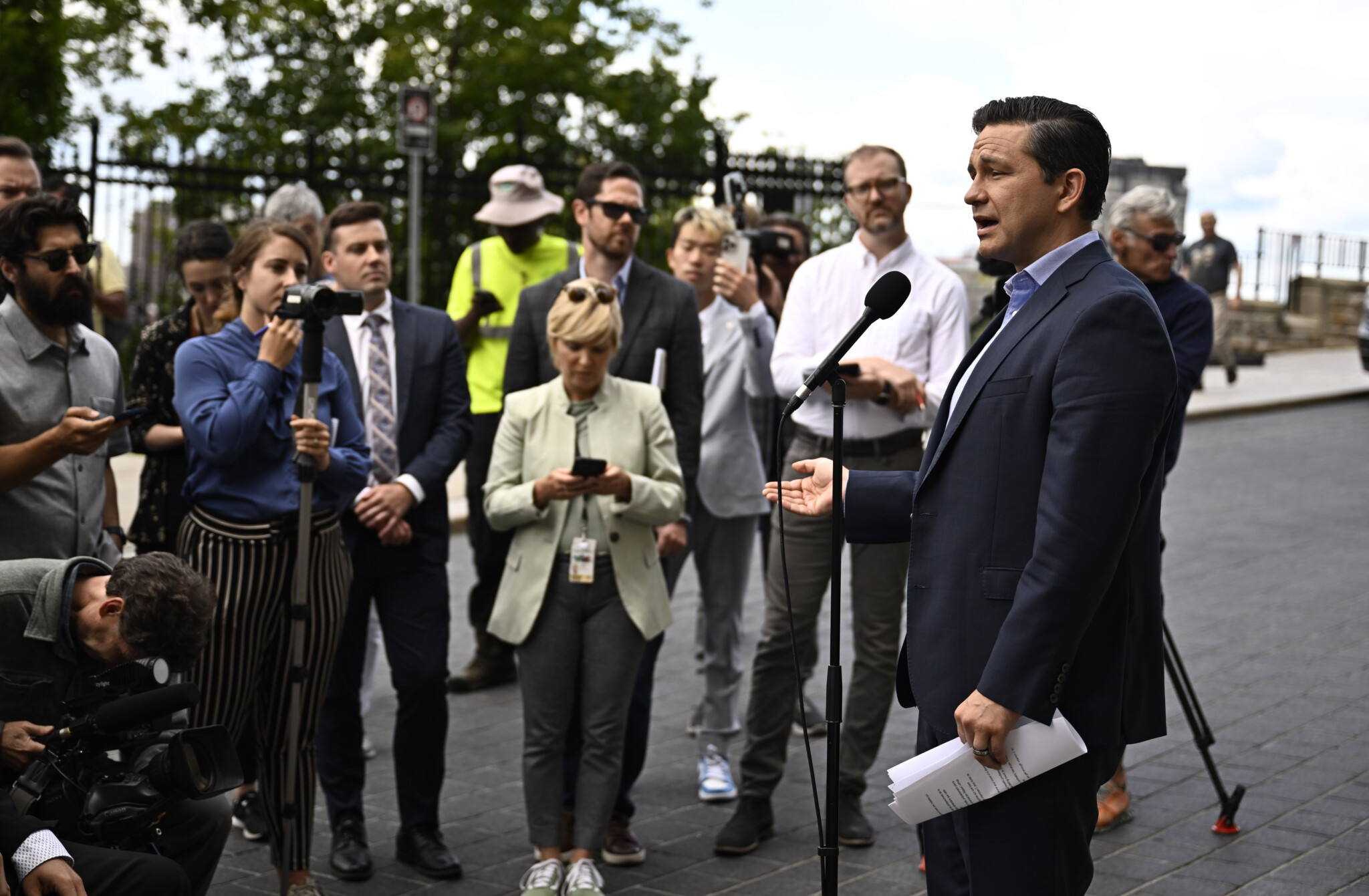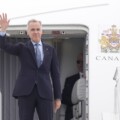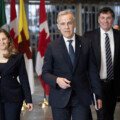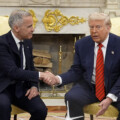This month, Conservative Party leader Pierre Poilievre made a pit stop in Niagara-on-the-Lake, Ontario. There, local newspaper Niagara Now asked him various questions about how he plans to support local journalism, and whether as prime minister, he would continue to fund the Local Journalism Initiative (LJI), a key part of the Liberal government’s efforts to subsidize private news outlets to the tune of hundreds of millions.
The LJI program pays for the salaries of journalists (up to $60,000 annually) working in small communities across Canada and costs about $20 million a year. It’s also a program that directly funds Niagara Now, providing employment for at least two of its staff.
Poilevre said that rather than helping local journalism, Prime Minister Trudeau had deeply damaged, it while working to control its coverage.
“He’s tried to take it over and basically wants everyone to work for the government so that he can have regurgitated propaganda paid for by taxpayers,” he told the paper.
When asked how his potential Conservative government would approach the issue of saving local reporting, Poilievre said the answer was free speech. He said he would re-examine the LJI, and that he would repeal what he called “censorship laws” that have meant news has been blocked on Facebook and Instagram. Poilievre also encouraged journalists to sell subscriptions, advertising, and sponsorships, rather than relying on subsidies.
“That’s how it has worked for 3,000 years,” he explained.
Unhappy with his response, Niagara Now editor-in-chief Richard Harley penned what could be the publication’s longest-ever editorial, and gave it the headline “Poilievre is truly great—at pandering.” In it, he praised the Trudeau government’s approach to local journalism, insisting LJI journalists do not get their marching orders from Liberals, said the Conservative leader was misleading voters with “dangerous lies,” bemoaned untrustworthy “citizen” journalists, and called out tech giants like Google and Meta for using content he said belonged to exploited Canadian journalists. He ended his piece by stating, “Either he’s [Poilievre] lying to you and knows it. Or he’s just incompetent.”
Over the weekend, this local journalism spat went national, with politicians including Liberals who helped craft the media subsidies, weighing in.
For critics of these subsidies, the Liberals’ coordinated defence of Niagara Now laid bare the conflict of interest Canadian outlets who receive government subsidies now find themselves in; being funded by the elected officials they are meant to be holding accountable. The Hub has previously published exclusive polling showing government funding of the news industry could further erode Canadians’ trust in the media. Almost three-quarters (73 percent) of Canadians agreed that if the government was funding the news, this would make it more difficult for news media to hold government to account.
Here are five Tweets reacting to the editorial and what it means for Canada’s media market.
Katie Telford, chief of staff to Prime Minister Trudeau, reposted the Niagara Now editorial, encouraging her followers to “read the whole thing.”
"Conservative leader Pierre Poilievre delivered a plethora of lies during his visit to NOTL, forcing The Lake Report to respond with the longest editorial it has ever published."
— Katie Telford (@telfordk) August 15, 2024
Read the whole thing ⬇️ ⬇️https://t.co/NmigolZf3Q
Deputy Prime Minister and Finance Minister Chrystia Freeland also boosted the piece, tweeting that the editorial “is exactly why local journalism matters.”
This is exactly why local journalism matters.
— Chrystia Freeland (@cafreeland) August 16, 2024
//
Et voilà précisément pourquoi le journalisme local est si important.https://t.co/OXtVeOZVXs
Liberal cabinet ministers came out in droves, in both official languages, to support the editorial. Fifty percent of federal ministers posted or re-posted about the editorial. These included: Minister of International Development Ahmed Hussen, Minister of Public Safety, Democratic Institutions and Intergovernmental Affairs Dominic LeBlanc, Minister of Indigenous Services Patty Hajdu, and Minister of Immigration, Refugees and Citizenship Marc Miller, who insinuated that Poilievre was a “snake oil” salesman.

From left to right on X: Marc Miller, Ahmed Hussen, Dominic LeBlanc, Kamal Khera, Patty Hajdu, Jean-Yves Duclos, Ya’ara Saks, Rechie Valdez, Marie-Claude Bibeau, Randy Boissonnault, Karina Gould, Soraya Martinez Ferrada.
Still, others voiced their displeasure with the editorial’s message.
Conservative MP Michael Chong responded to Freeland’s post, arguing that as a former journalist, she should know better than to praise journalists subsidized by her government for criticizing her political opponents.
As in when your government creates a new program to subsidize newspapers like Niagara Now & you praise its journalists for attacking your political opposition. How convenient.
— Michael Chong 🇨🇦 (@MichaelChongMP) August 17, 2024
As a former journalist you should know better. In a democracy, we need a truly independent press (i.e.… https://t.co/yAbPhxj1JA
The Hub’s very own editor-at-large Sean Speer posted on X criticizing Harley’s editorial, which he said was “dedicated to calling Pierre Poilievre a liar” because the leader disagreed with journalism subsidies. He said this was an example of how the government subsidy regime is influencing journalism. Speer added that the journalists’ questions about local journalism can be seen as a lobbying effort to preserve a program that pays their outlet’s salaries.
The news media tell us that the public subsidy regime won’t influence its journalism.
— Sean Speer (@Sean_Speer) August 15, 2024
Yet here’s an entire editorial dedicated to calling Pierre Poilievre a liar because he disagrees that the government should directly and indirectly subsidize the newspaper.
The legacy media… https://t.co/gKwKl6VEBG
Major backlash then ensued, with The Hub being called “bozos,” “Pravda,” “white supremacists,” and more.
Former Manitoba Liberal MLA Dougald Lamont shot back at Speer for accusing the Niagara journalists of what he called “false accusations of collusion.” He tweeted, “[Sean Speer] attacks the credibility of the paper and suggests it can’t be trusted because it receives public money, when his own media outlet is being funded by Meta.”
This is shameful and corrosive to democracy, accountability and a free press in Canada. @sean_speer, who runs @thehubcanada - which is funded by @Meta - attacks a journalist who points out some embarrassing but accurate facts about the Conservative leader.
— Dougald Lamont (@DougaldLamont) August 17, 2024
The op-ed spells… https://t.co/FdbFpjcdIS
While refusing government media subsidies, The Hub has participated in one partnership with Meta for its Future of News series. The goal of the campaign was to profile different business models and perspectives across Canada on how the news media industry is reinventing itself in the face of new technologies, evolving consumer preferences, and a difficult financial environment. This partnership was transparently disclosed to the public for the duration of the series. Throughout our news reporting, Meta had no editorial control in how pieces were covered. To say that The Hub “is funded by Meta,” implying that it is a major funding source with editorial control, is categorically false.
In light of the melee on X, Peter Menzies, former newspaper executive, and past vice chair of the CRTC, wrote a commentary in The Hub.
“There are increasingly few media platforms out there that value public trust in their independence and are willing to post commentary critical of the government’s growing financial leverage in the newsrooms of the nation,” he wrote.
The Hub looks forward to ongoing (hopefully civil) conversations around growing government subsidies in journalism.








